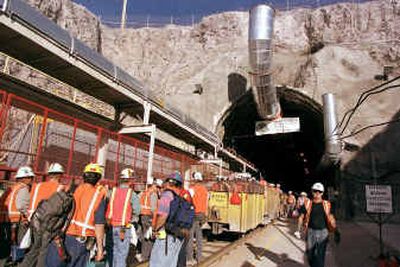Court OKs nuke dump site

WASHINGTON — An appeals court on Friday upheld the government’s decision to single out Nevada as the site of a nuclear waste dump but ruled that the federal plan does not go far enough to protect people from potential radiation beyond 10,000 years in the future.
While the court dismissed virtually all of the arguments raised by Nevada and environmentalists against the Yucca Mountain project, its rejection of the radiation standard raised new questions about whether the waste repository will be built — or at least meet its target of 2010 to begin operation.
Energy Secretary Spencer Abraham said he was confident the radiation exposure standard could be resolved. He said Friday’s court ruling had “dismissed all challenges to the site selection of Yucca Mountain” and the project was moving forward..
But lawyers for Nevada and environmental groups said the court’s rejection of the Environmental Protection Agency’s proposed radiation exposure limits could doom the project.
“We think we put a stake through the heart of this project,” said Joe Egan, an attorney for Nevada in the Yucca Mountain litigation.
Antonio Rossmann, who argued the EPA radiation matter before the court on behalf of the state, called it “the first domino” on which the project could fall, depending on whether it is resolved.
The three-judge panel of the U.S. Court of Appeals rejected Nevada’s claims that it was unconstitutional to single out the state for a national nuclear waste site, located 90 miles northwest of Las Vegas. The panel also refused to review how the Bush administration chose the site, although Nevada had argued the process was illegal. Citing these rulings, Abraham said he was pleased the court ruling had removed any question about the legality of the site selection process.
But a senior Energy Department official, speaking on condition of anonymity, acknowledged the court’s rejection of the radiation standard — as well as recent budget problems for the project in Congress — could cause delays. He said fixing the radiation standard may require more congressional action.
The three-judge panel said the EPA acted illegally when it limited the radiation exposure requirements to 10,000 years into the future when Congress directed the agency to develop a rule “consistent” with recommendations from the National Academy of Sciences.
“The EPA wholly rejected the academy’s recommendations,” the judges wrote. They said the EPA must either issue a revised standard consistent with the NAS findings or get Congress to give it authority to deviate from the NAS recommendations.
Congress by a wide margin approved the Yucca site in 2002 under very restrictive rules laid out by the nuclear waste law.